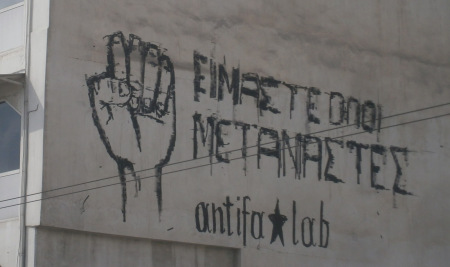
Αναδημοσιεύουμε την ελληνική μετάφραση του άρθρου από το barikat.gr
Ήμασταν στην άκρη της πλατείας Ταχρίρ την Τετάρτη 3 Ιουλίου, όταν ο στρατός έκανε την ανακοίνωσή του. Η πλατεία ξέσπασε σε πανηγυρισμούς. Ένα μέλος της ομάδας μας κοίταξε το κινητό του. Ούρλιαξε ανάμεσα στη βοή από τα τύμπανα και τις βουβουζέλες: «Ο Μόρσι έπεσε. Διόρισαν στη θέση του τον πρόεδρο του συνταγματικού δικαστηρίου και αναστείλανε τις εκλογές.»
Παρακολουθούσαμε τους πανηγυρισμούς. Κοίταξα γύρω μου τους ανθρώπους που ήξερα, με μερικούς από αυτούς είχα μοιραστεί – πώς να το πω, την Ταχρίρ του τότε; – και τα επόμενα δυόμιση χρόνια θυμού, χαράς, εξάντλησης, θριάμβου, απελπισίας. Τα πρόσωπά τους ήταν ανέκφραστα σαν και το δικό μου. Το μόνο συναίσθημα που είχα ήταν φόβος – όχι για το πολιτικό μέλλον, για αυτό ένιωθα πλέον ότι δεν καταλάβαινα τίποτα και ότι είχα χάσει κάθε ελπίδα – αλλά για την αμέσως επόμενη στιγμή: πως θα μπορούσαμε να ξαναφτάσουμε στην πλατεία;
Πέρασαν δέκα λεπτά, δεν μπορούσαμε να το αναβάλλουμε άλλο. Έπρεπε να παραδώσουμε φαί στις ομάδες επέμβασης που βρίσκονταν γύρω από την πλατεία και οι πανηγυρισμοί θα γίνονταν όλο και πιο μαζικοί και πυρετώδεις όσο θα προχώραγε η νύχτα. Σχηματίσαμε μία γραμμή και βουτήξαμε στο πλήθος, κρατώντας σφιχτά ο ένας τον άλλο και προσπαθώντας να προφυλαχθούμε από τα επιθετικά χέρια γύρω μας. Προσπαθούσα να είμαι εκεί, παρούσα – αν όχι να απολαμβάνω τους πανηγυρισμούς, τουλάχιστον να τους ακούω – αλλά το μόνο που μπορούσα να σκεφτώ ήταν πως θα παρέκαμπτα αυτή την κοσμοπλημμύρα. Σε κάποιο μακρινό μέρος του μυαλού μου αναρωτιόμουνα για το φόβο: είναι μια ιδέα ή μια πραγματική αντίληψη του σώματος; Εάν δεν ήξερα τι έκανα, θα μπορούσα να νιώσω την ανάταση, να χαθώ στο πλήθος όπως είχα κάνει παλιότερα;
Φτάσαμε την πρώτη ομάδα επέμβασης και κατέρρευσα ανάμεσά τους – ένα νησί ασφάλειας μέσα στην πλατεία. Αυτή δεν ήταν κάποια επιδέξια ομάδα ειδικών δυνάμεων με ομοιόμορφες στολές. Ήταν μια ομάδα γυναικών, γυναικών που φορούσαν λευκά μπλουζάκια με κόκκινη γραμματοσειρά που έγραφε: «Αντι-Σεξουαλική Κακοποίηση» και στο πίσω μέρος: «Μία Πλατεία Ασφαλής για Όλους.»
Ήταν η πρώτη μου μέρα ως εθελόντρια στην Επιχείρηση Αντι-Σεξουαλική Κακοποίηση/Επίθεση (OpAntiSH). Η Ταχρίρ ήταν το τελευταίο μέρος που θα ήθελα να βρίσκομαι, με όλα αυτά που είχα ακούσει πρόσφατα. Και όμως – δεν ένιωθα πια πως έχω θέση στις πορείες που γίνονταν σε διάφορα σημεία της πόλης, δεν μπορούσα να μείνω σπίτι και δεν μπορούσα να αγνοήσω το ένα πράγμα που ανάμεσα σε όλη αυτήν την τρέλα έμοιαζε να έχει πραγματικά σημασία. Βγαίνοντας από το ταξί δίπλα στο Νείλο εκείνο το απόγευμα και περπατώντας μόνη μέχρι το σημείο συνάντησης πίσω από την πλατεία, έτρεμα από το φόβο. Καθώς μαζευτήκαμε για να ενημερωθούμε, ένα μέρος μου σάστισε με τα κόκκινα νύχια της κοπέλας που στεκόταν δίπλα μου, με τα χαμόγελα στα πρόσωπα των ανθρώπων, όταν στο δικό μου θα πρέπει να ήταν ζωγραφισμένη η τραγωδία – κάτι σαν την αφέλεια της νεοφερμένης. Δεν είχα ακόμη το χρόνο να συνηθίσω, να εγκλιματιστώ.
Χωριστήκαμε σε μεικτές ομάδες των δέκα. Η αποστολή μας ήταν να ενημερώσουμε τον κόσμο για το τι συμβαίνει και να τους πούμε τι να κάνουν σε περίπτωση που δουν κάτι. Θα κινούμασταν γρήγορα και θα μέναμε κοντά ο ένας στον άλλο – το να αποκρυνθούμε θα ήταν επικίνδυνο.






